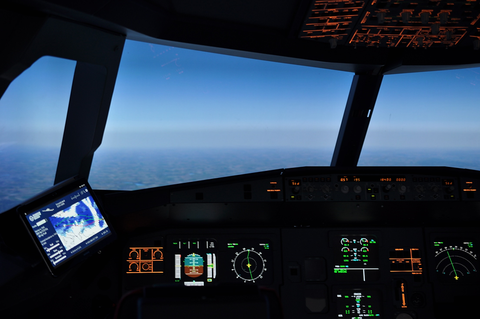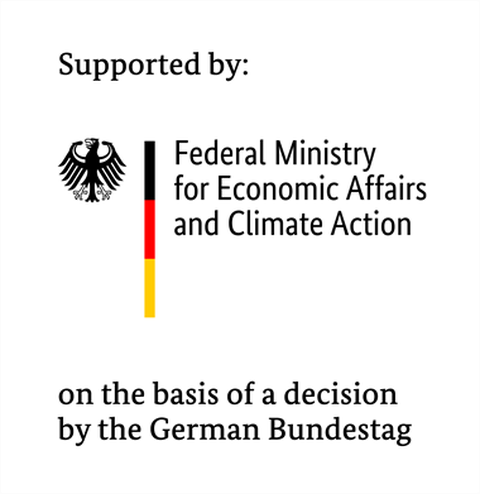ProfiFuel: Improved planning and realization of flight profiles with the lowest ecological footprint and minimum fuel consumption
Project information
- Employer: Federal Ministry for Economic Affairs and Energy (BMWi)
- Consortium: Jeppesen Inc., Gesellschaft für Luftverkehrsforschung GmbH
- Period: 39 months, January 2017 - March 2020
In ProfiFuel, methods are developed that allow for trajectory optimization during flight planning and as an trajectory update during flight in the cockpit. We attach importance on an application-friendly manner considering various target functions of different air traffic providers, i.e., air navigation services and air carriers.
The IFL particularly aspires to expand the Electronic Flight Bag (EFB) as a portable trajectory calculation display device in the cockpit, complemented by a user friendly GUI and HMI as well as the required technologies due to the increased data transfer.

IFL's Airbus A320 simulation environment with an implemented EFB application, providing information on the optimal flight trajectory
Finally, a pilot's decision support in the choice of the trajectory wil be developed. Thereby, alternative trajectories will be calculated, evaluated and suggested for the pilot in case of deviations from the desired trajectory or its input variables. Here, changes in the input variables, for example, deviations from the weather prediction or the planned fuel flow, as well as unpredictable short-term, small-scale weather events or occurring ice-supersaturated regions are considerable. For this application, the EFB must be equipped with an enhanced HMI, a graphical user interface (GUI), and an efficient interface between the EFB and the Flight Management System. An additional challenge of the project is the expected due to an increased workload of the pilot by the increased interaction with the EFB, which must to be minimized by optimal HMIs and GUIs.
The objective functions of multi-criteria trajectory optimization, developed in the project MEFUL are now connected with the JetPlanner, the flight planning tool of Jeppesen. JetPlanner is used by Jeppesen for flight planning of operational flights. The aim of ProfiFuel is to enhance this dispatch towards eco-efficient trajectory optimization with minimum impact on global warming. This is done by a multi-criteria trajectory optimization which objective functions are planned to be improved during the flight due to more precise and actual input data.
Furthermore, an extensive set of input data is expected due to the communication of the EFB with the aircraft FMS, with weather stations and preceding aircraft. Therewith, more accurately optimized trajectories are calculated, assessed and proposed to the flight crew (compare Figure 1)

Trajectories from Frankfurt to Baku (Aserbaidschan) in an ice-supersaturated environment. The optimized trajectory (dark green) is different from the real flown trajectory (black and red). Beginning at the current aircraft position, a new optimized trajectory is calculated and flown (light green). The Flight Management System would follow the red trajectory.
Considering actual atmospheric conditions the new trajectory is compared with the originally planned one, differences are shown to the flight crew and actions are recommended. A challenge is expected in handling the computational effort.
Multi-criteria target functions are considered. For example, a cost optimized trajectory right through an ice-supersaturated region will not satisfy minimum costs anymore, due to high environmental costs of condensation trails. Hence, the algorithm will find a cost minimum between a large detour around the ice-supersaturated region and the increased environmental costs (e.g., an altitude change).
Due to the communication of the EFB with the aircraft FMS, with weather stations and with preceding aircraft, more precise parameters (most notably FDR data (Flight Data Recorder) of the Onboard Networking System (ONS)) for the trajectory optimization are expected during flight. Therewith, the radiative forcing of the emissions can be estimated accurately and a different optimized trajectory may be calculated and assessed.
The assessment of radiative active emissions is realized with the help of the Global Warming Potential (GWP), which defines the relative contribution of the emission species to global warming (i.e., the radiative forcing) compared to the emissions of CO2. This GWP depends on the position anf time of the emission. Especially the formation of condensation trails (contrails) depends on time and position. In a cold and ice-supersaturated ambient atmosphere, contrails form into Aircraft Induced Cloudiness (AIC) with a significant impact on global warming. The time- and position dependent assessment of the radiative forcing of individual contrails is the main part of this work package.

Condensation trails
The aim of this work package is the integration of the optimization modules in both the JetPlanner and the portable EFB application, to enable an eco-efficient flight planning. Thereby, the trajectory optimization during flight with dynamic input parameters will be emphasized .

EFB Application in the cockpit.
The functionality and connectivity of each submodel will be testet and validated in scenarios. Therefore, the Institute's simulation environment will be expended by the required Human–machine interface, the graphical user interface of the EFB and the comunication technology (datalink) to the ground control station. Furthermore, tests with the Boeing ecoDemonstrator of Jeppesen are planed for the validation of the fuel flow prediction and the proposed ecoefficient trajectories.
During the project, following activities and results were publicated.
Further project-specific publications can be found at MEFUL .
- Judith Rosenow, Martin Lindner, Joachim Scheiderer (2021), Advanced Flight Planning and the Benefit of In-Flight AircraftTrajectory Optimization Sustainability 13 (3), 1383 , https://doi.org/10.3390/su13031383
- Judith Rosenow, Philipp Michling, Michael Schultz, Jörn Schönberger (2020),Evaluation of Strategies to Reduce the Cost Impacts of Flight Delays on Total Network Costs, Aerospace 7 (11), 165, DOI10.3390/aerospace7110165
- Martin Lindner, Judith Rosenow, Thomas Zeh, Hartmut Fricke (2020) In-Flight Aircraft Trajectory Optimization within Corridors Defined by Ensemble Weather Forecasts, Aerospace 7 (10), 144, DOI:10.3390/aerospace7100144
- Judith Rosenow, Philipp Michling, Michael Schultz (2020) Kompensationsstrategien reaktionärer Verspätungskosten, Ingenieurspiegel 3/2020
- Judith Rosenow, David Schiller (2019): Efficiency in Internalizing External Environmental Costs in Maritime and Air Transport, Multilog - Challenges and Innovative Solutions for Multimodality in Global Transport Networks, Huatulco, Mexico, 2019
- Martin Lindner, Judith Rosenow, Stanley Förster, Hartmut Fricke (2019): Potential of integrated flight scheduling and rotation planning considering aerodynamic-, engine-and mass-related aircraft deterioration, CEAS Aeronautical Journal, volume 10, pages755–770(2019) DOI:10.1007/s13272-018-0344-x
- Judith Rosenow, Hartmut Fricke (2019):Condensation Trails in Trajectory OptimizationThirteenth USA/Europe Air Traffic Management Research and Development Seminar (ATM2019), 2019
- Judith Rosenow, Hartmut Fricke (2019):Individual Condensation Trails in Aircraft Trajectory Optimization, Sustainability, Volume 11, Issue 21, DOI: 10.3390/su11216082
- Martin Lindner, Judith Rosenow, Hartmut Fricke (2019): Aircraft trajectory optimization with dynamic input variables, CEAS Aeronautical Journal, https://doi.org/10.1007/s13272-019-00430-0
- Judith Rosenow, David Strunck, Hartmut Fricke (2019):Trajectory Optimization in Daily Operations, CEAS Aeronautical Journal, https://doi.org/10.1007/s13272-019-00429-7
- Judith Rosenow, Hartmut Fricke (2019): Impact of multi-criteria optimized trajectories on European airlineefficiency, safety and airspace demand, Journal of Air Transport Management, Volume 28, pp. 133-143 https://doi.org/10.1016/j.jairtraman.2019.01.001
- Judith Rosenow, Marco Berger, Martin Lindner, Hartmut Fricke (2019) Trajektorienoptimierung in der Luft, Ingenieurspiegel 3/2019
- Judith Rosenow and Michael Schultz (2018) 4D Trajectory Prediction with Stochastic Input Parameters, Advanced Aircraft Efficiency in a Global Air Transport System (AEGATS’18), Toulouse, France
- Judith Rosenow, Stanley Förster, Martin Lindner. Hartmut Fricke (2018): Multicriteria-Optimized Trajectories Impacting Today’s Air Traffic Density, Efficiency, and Environmental Compatibility, Journal of Air Transportation, Volume 27, Issue 1. doi: https://doi.org/10.2514/1.D0086
- Judith Rosenow, David Strunck, Hartmut Fricke (2018): Free Route Airspaces in Functional Air Space Blocks Free Route Airspaces in Functional Air Space Blocks Sixth SESAR Innovation Days, Salzburg
- Martin Lindner, Thomas Zeh, Hartmut Fricke (2018): Reoptimization of 4D-Flight Trajectories During Flight Considering Forecast Uncertainties, 67. DGLR Kongress, Friedrichshafen
-
Judith Rosenow, David Strunck, Hartmut Fricke (2018): Trajectory Optimization in Daily Operations, 8th International Conference on Research in Air Transportation, Castelldefels
-
Martin Lindner, Judith Rosenow, Hartmut Fricke (2018): Dynamically Optimized Aircraft Trajectories Affecting the Air Traffic Management, 8th International Conference on Research in Air Transportation, Castelldefels
- Judith Rosenow, Hartmut Fricke, Tanja Luchkova, Michael Schultz (2018): Minimizing contrail formation by rerouting around dynamic ice-supersaturated regions, Aeronautics and Aerospace Open Access Journal, Volume 2, Issue 3
- Yannic Brodersen, Tanja Luchkova, Annette Temme, Martin Lindner, Juditih Rosenow, Michael Schultz (2017): Entwicklung und Bewertung von Formationsflugszenarien Unbemannter Frachtflugzeuge, Deutscher Luft- und Raumfahrtkongress 2017, München
- Judith Rosenow, Hartmut Fricke, Michael Schultz (2017): Air traffic simulation with 4D multi-criteria optimized trajectories, Winter Simulation Conference 2017, Las Vegas
- Judith Rosenow, Hartmut Fricke, Tanja Luchkova, Michael Schultz (2017): Impact of optimized Trajectories on Air Traffic Flow Management, Modelling and Simulation in Air Traffic Management, London
- Judith Rosenow, Martin Lindner, Hartmut Fricke (2017): Impact of climate costs on airline network and trajectory optimization: a parametric study, CEAS Aeronautical Journal, Volume 8
- Judith Rosenow and Hartmut Fricke (2017): Impact of Multi-critica Optimized Trajectories on European Airline and Network Efficiency, Air Transport Research Society World Conference 2017, Antwerp
Are you looking for an interesting student thesis? If you are interested in one of the project related topics, please contact us.
- StA Lyskawa (2018): Voraussetzungen für eine dynamische Sektorisierung im europäischen Luftraum
- StA Huhnd (2018): Anwendung und Bewertung einer Berechnungsvorschrift des Schalldruckpegels von Luftfahrzeugen auf optimierte Trajektorien
- StA Brauer (2018): Konzeptentwicklung der graphischen Benutzeroberfläche eines Electronic Flight Bag für eine neue Funktionalität „Trajektorienoptimierung“
- StA Mrokwa (2018): Modellierung und Validierung der direkten Flugbetriebskosten am Beispiel der Software zur Trajektorienoptimierung „TOMATO“
- Lab project (2018): Optimale Integration wegpunktloser Trajektorien in die aktuelle ATM Luftraumstruktur
- DA Yeruzel (2018): Validierung und Erweiterung einer zweistufigen Vertikalprofiloptimierung am Beispiel der Trajektorienoptimierung TOMATO
- DA Braßel (2018): Entwicklung optimaler Flugrouten kleiner unbemannter Fluggeräte unter Verwendung von Kartenmaterial der Geoinformationssysteme
- DA Vasileva (2018): Steigerung der Flughafenkapazität unter Anwendung der Wirbelschleppen Re-Kategorisierung RECAT-EU
- DA Bumke (2018): Bewertung des Aktualisierungsaufwandes des FMS bei eines nach dem Start optimierten Flugplans in Abhängigkeit des Änderungsumfanges
- StA Asmus (2017): Überführung existenter Algorithmen zur Konflikterkennung auf wegpunktlose Flugtrajektorien
- DA Hieke (2017): Entwicklung eines Algorithmus zur Konflikterkennung und -lösung wegpunktloser Flugtrajektorien
- DA Brühl (2017): SMS Umsetzung identifizierter flugbetrieblicher Sicherheitskennzahlen (SPI)
- Forschungspraktikum Klotzsche (2017): Konzeptentwicklung einer Electronic-Flight-Bag-gesteuerten Trajektorienoptimierung in einer A320 Simulationsumgebung
- StA Baumjohann (2017): Wirkung einer aktualisierten Luftfahrzeugmassenabschätzung nach Verlassen der Parkposition auf die Flugtrajektorienoptimierung
- DA Steinmeier (2017): Modellierung und Implementierung einer zeit- und kraftstoffkostenbasierten Flugdurchführung am Beispiel des Flugleistungsmodells COALA
- StA Steinmeyer (2017): Entwicklung einer methodischen Verfahrensweise zur Ermittlung von Ausweichrouten im Falle eines Triebwerkausfalles auf der standardisierten Abflugroute (SID)
-
StA Hensel (2017): FDR-Datenanalyse zur Entwicklung einer verbesserten Luftfahrzeug-Massenschätzfunktion in der Kraftstoffberechnung von Luftfahrzeugen, unter weiterer fachlicher Betreuung durch GfL Gesellschaft für Luftverkehrsforschung
- DA Klußmann (2017): Development of an innovative global market based measure scheme to internalize costs of pollution in air transport
- StA Spitzner (2017): Entwicklung und Bewertung von Technologien für die Kommunikation im Luftverkehr

